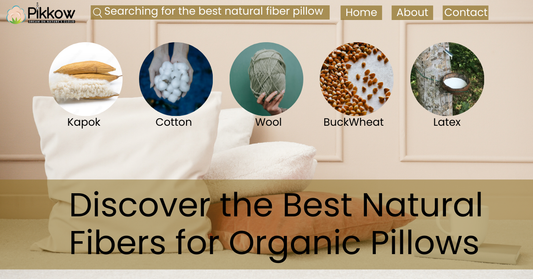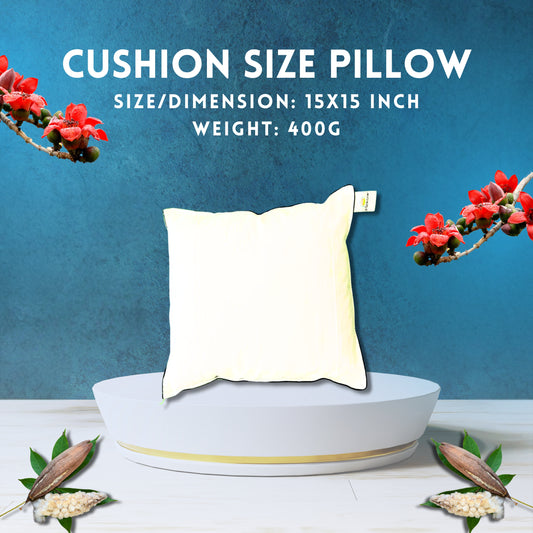Every parent wants the best for their child, especially when it comes to sleep. A good night’s rest is crucial for a baby’s growth and development, but did you know that synthetic pillows may be harming their health? Many conventional pillows are made with harmful chemicals, allergens, and artificial materials that can affect your child’s breathing and comfort.
Switching to an organic toddler pillow or an organic baby pillow is a simple yet powerful step toward a healthier sleep environment. Let’s explore why organic pillows are the best choice for your little one.
The Problem with Synthetic Pillows
Most conventional pillows are made from synthetic materials like polyester, memory foam, or polyurethane. These materials can pose serious health risks to children due to:
1. Harmful Chemicals
Synthetic pillows often contain flame retardants, formaldehyde, and VOCs (volatile organic compounds). These chemicals release toxic fumes, which babies and toddlers inhale while sleeping.
2. Poor Breathability
Polyester and memory foam pillows trap heat and moisture, creating an uncomfortable and sweaty sleeping environment.
3. Allergen Accumulation
Dust mites, mold, and bacteria thrive in synthetic materials, leading to allergies, asthma, and respiratory issues in young children.
4. Lack of Proper Support
Synthetic pillows often lack the right balance of softness and firmness, which can lead to poor posture and discomfort for babies and toddlers.
Solution? Switch to an organic baby pillow for a safer, more breathable sleep experience!
Why Choose an Organic Baby Pillow?
An organic baby pillow is crafted from natural, chemical-free materials, ensuring a safer and healthier sleep environment. Here’s why they are superior:
1. Free from Harmful Toxins
Organic pillows are made from materials like organic cotton, kapok, wool, or latex—free from pesticides, flame retardants, and synthetic chemicals.
2. Hypoallergenic & Antibacterial
Natural materials repel dust mites, bacteria, and mold, reducing the risk of allergies and respiratory problems.
3. Breathable & Temperature Regulating
Organic fibers allow air to circulate, keeping your baby cool in summer and warm in winter.
4. Soft yet Supportive
Organic pillows provide the right amount of firmness for head and neck support, crucial for baby’s spinal development.
5. Sustainable & Eco-Friendly
Choosing organic means reducing environmental impact. Organic farming avoids harmful pesticides and supports sustainable agriculture.
Benefits of an Organic Toddler Pillow
As your child grows, transitioning from an organic baby pillow to an organic toddler pillow provides added benefits, including:
|
Feature |
Organic Toddler Pillow |
Synthetic Toddler Pillow |
|
Material |
Organic cotton, kapok |
Polyester, memory foam |
|
Chemical-Free |
Yes |
No |
|
Breathability |
Excellent |
Poor |
|
Hypoallergenic |
Yes |
No |
|
Durability |
Long-lasting |
Wears out quickly |
|
Eco-Friendly |
Yes |
No |
An organic baby pillow provides optimal neck and head support, ensuring deep, restful sleep.
Best Materials for Organic Baby & Toddler Pillows
1. Organic Cotton
- Soft, breathable, and hypoallergenic
- Free from pesticides and synthetic dyes
- Ideal for sensitive skin
2. Kapok Fiber
- Naturally silky and fluffy
- Water-resistant and mold-resistant
- 100% biodegradable and eco-friendly
3. Organic Wool
- Temperature-regulating and moisture-wicking
- Naturally resistant to dust mites
- Provides firm but comfortable support
4. Natural Latex
- Durable and supportive
- Resistant to bacteria and dust mites
- Provides excellent spinal alignment
Each material has unique benefits, so choosing one depends on your child’s needs.
How to Choose the Right Organic Pillow for Your Child
1. Consider the Fill Material
- Soft and fluffy: Kapok or organic cotton
- Firm and supportive: Wool or natural latex
2. Choose the Right Size
- Babies: Thin, flat pillows for safe breathing
- Toddlers: Slightly thicker pillows for proper neck support
3. Look for Certifications
- GOTS (Global Organic Textile Standard)
- OEKO-TEX Standard 100
- USDA Organic
4. Read Reviews & Recommendations
Check what other parents say about durability, comfort, and overall quality before buying.
Care and Maintenance Tips
To extend the life of your organic baby pillow and organic toddler pillow, follow these care tips:
✅ Use a Pillow Protector – Keeps the pillow clean and free from spills.
✅ Air Out Regularly – Place in the sun to naturally disinfect and refresh.
✅ Spot Clean When Needed – Use mild soap and water.
✅ Avoid Machine Washing (unless stated) – Washing can damage natural fibers.
By caring for your organic pillow properly, you ensure long-term comfort and hygiene.
Conclusion
Making the switch from synthetic to organic baby and toddler pillows is one of the best decisions for your child’s sleep health. Organic pillows provide superior comfort, breathability, and safety while eliminating exposure to harmful chemicals. They also support sustainable living, making them a responsible choice for parents.
Your little one deserves the best start in life, and sleep is a big part of their well-being. Invest in a high-quality organic toddler pillow or organic baby pillow, and enjoy peace of mind knowing your child sleeps soundly in a safe and healthy environment.
FAQs
1. When should I introduce a pillow to my baby?
It is generally recommended to introduce a pillow after 12-18 months. For infants, sleeping on a flat surface without a pillow is safest.
2. How do I clean an organic baby pillow?
Most organic pillows can be spot cleaned. Some have removable covers that can be machine-washed. Always check the care instructions.
3. What is the best fill material for an organic toddler pillow?
Kapok and organic cotton are great for softness, while wool and latex provide better firmness and support.
4. Are organic baby pillows worth the price?
Yes! They last longer, are free from harmful chemicals, and provide better sleep quality, making them a great investment.
5. How do I know if a pillow is truly organic?
Look for certifications like GOTS, OEKO-TEX, or USDA Organic to ensure authenticity.











